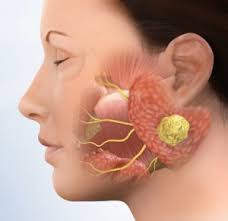parathyroid adenoma surgery:Parotid:Parotidectomy
overview
- A parotidectomy is the removal of the parotid gland. It is the largest of the salivary glands. Located in front of the ears, the parotid gland is responsible for making and secreting saliva. Saliva is important for digestion of food, killing bacteria in the mouth and preventing tooth decay.
- Salivary gland cancers often start in the parotid gland. They are rare and most parotid tumors are benign (not cancerous).
- A parotidectomy may be done to treat some cases of salivary cancer. It may also be done to treat non-cancerous conditions like chronic infection or an obstruction of the salivary glands.
Types of parotidectomy
There are two types of parotidectomy:
- Superficial parotidectomy: removal of the superficial (outer part) of the parotid gland. This is done by the surgeon making a cut in front of the ear and down the neck. This does not often affect how the face moves, because it attempts to not harm the facial nerve.
- Total parotidectomy: removal of the entire parotid gland. This is done by the surgeon making a cut in front of the ear and down the neck. The facial nerve, as well as other tissues, may need to be removed depending on where the tumor is. This could affect how your face is able to move.
- Surgery is the most common treatment for parathyroid adenoma, even for people who don’t feel like they have any symptoms. For patients who have had high calcium levels for a number of years, it would be hard for them to tell if they are truly without symptoms.
- Parathyroidectomy can make patients feel better, thus improving the overall quality of time. More importantly, parathyroidectomy can prevent osteoporosis and kidney stones.
- The most common treatment is to remove the enlarged gland (or glands). This surgery cures the problem up to 98% of the time.
- In patient who are too ill to have surgery, medication may be the only option. The different medications don’t reduce the extra amount of parathyroid hormone in the blood. Instead, they fight back by preventing the loss of calcium from bone. Hormone replacement therapy or other treatments for this condition must be taken for the rest of your life.
- A prescription medication called cinacalcet (Sensipar®) reduces both calcium and parathyroid hormone levels in people with chronic kidney failure (secondary hyperparathyroidism). Its use in people with primary hyperparathyroidism is still being studied.
- Dr. Shilpi Sharma Best Parathyroid Surgery Doctors In Gurgaon.




